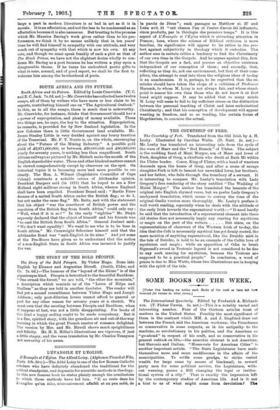SOUTH AFRICA AND ITS FUTURE.
South Africa and its Future. Edited by Louis Creswicke. (T. C. and E. C. Jack. 7s. 6d. net.)—Mr. Creswicke has collected here twelve essays, all of them by writers who have more or less claim to be experts, contributing himself one on The Agricultural Outlook." In this, as in all the essays, there is much that is noteworthy. Mr. Creswicke, for instance, thinks that Government'should have a power of expropriation, and plenty of money available. These two things axe, he says, the key to the situation. Expropriation, he remarks, is provided for by New Zealand legislation. In the new Colonies there is little Government land available. Mr. James Stanley Little is very decided against any heavy taxation of the Transvaal. Mr. F. T. Norris is, on the whole, encouraging about the "Future of the Mining Industry." A possible gold yield of 42,871,000,000, or between 430,000,000 and 410,000,000 yearly for seventy years, is nothing less than magnificent. South African railways as pictured by Mr. Bleloch make the month of the English shareholder water. These and other kindred matters cannot be viewed comprehensively except by observers on the spot. On historical topics it is becoming more 'and more possible to see clearly. The Hon. A. Wilmot (Legislative Councillor of Cape Colony) constructs a notable catena, of Afrikander opinion. President Burgers said (in 1875) that he hoped to see a New Holland eight millions strong in South Africa, whence England shall have been expelled. President Brand said : "Bartle Frere dreams of a united South Africa under the British flag; so do I, but not under the same flag." Mr. Reitz, met with the statement that his object "was the overthrow of British power and the expulsion of the British flag from South Africa," could only say : "Well, what if it is so ? " In the early " eighties " Mr. Steyn expressly declared that the object of himself and his friends was "to oust the British from South Africa." General Joubert said "We don't want equality ! We want to see who is to be boss in South Africa." Mr. Cronwright Schreiner himself said that the Afrikander Bond was "anti-English in its aims." And yet some of the Pro-Boers have given us to understand that the notion of a non-English State in South Africa was invented to justify the war.










































 Previous page
Previous page